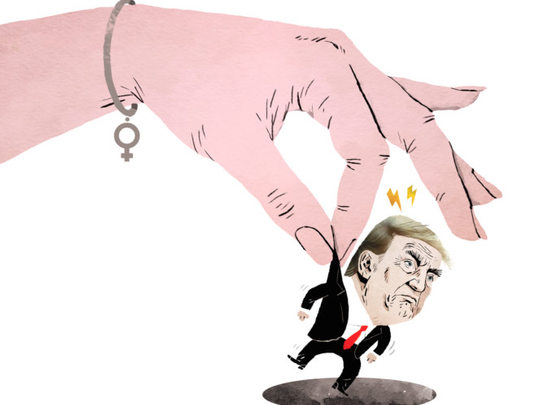
When I first reported the story of Jill Harth’s sexual assault accusation back in July, I didn’t get a single interview request to talk about it. The radio show I’d already been booked to go on engaged me only briefly, during an hour-long interview, on the matter of a woman accusing Donald Trump, the Republican presidential nominee in the United States, of grabbing her in a child’s bedroom at his Mar-a-Lago estate, before changing the subject.
Even Democratic opposition organisations had made a calculation early in the campaign that it wasn’t strategic to get into personal matters with Trump. Because he had said so many damning things out in the open, it hardly seemed necessary to skewer his personal life. Harth’s story is a complicated one and her character, like the characters of most living, breathing women, is also complex, but her accusation against Trump was always plausible. She has stood by it for 20 years. Now, finally, Harth’s account and those of women like her are not just gaining traction. They have been placed centre stage in the campaign.
Trump addressed crowds on Thursday, calling the most recent allegations “slander and libels ... part of a concerted, coordinated and vicious attack”, while US First Lady Michelle Obama made a powerful speech on what’s at stake this election. If Americans don’t vote against Trump, she said at a campaign event in Manchester, New Hampshire, “We’re telling our sons that it’s OK to humiliate women”. It’s not just the sexual assault allegations, she explained, though they cannot be marginalised. It’s about Trump’s entire world view. “What’s more, strong men,” Michelle said, “men who are truly role models, don’t need to put down women to make themselves feel powerful”.
Women know this. Americans know this. Why then did it take Trump to brag about sexual assault on video for America to take the claims seriously?
This is an issue that’s come up earlier this year, and not just on the presidential campaign trail. We didn’t need one woman to come forward against Bill Cosby in order to get society’s attention — we didn’t even need 10 of them to. We needed male comedian Hannibal Buress to make a joke about it. For a lone woman to be heard, she seems to require special status. Numerous women have now come out to accuse Roger Ailes, former Fox boss — and current Trump surrogate — of sexual harassment. But they were only empowered to do so after one of the country’s most famous female anchors filed a lawsuit.
It’s to be expected then, that what it actually took for America to take Harth and other women’s stories of sexual assault seriously was not their own complaints, or a female reporter airing them: It was Trump himself bragging about sexual assault on video. Similarly, Trump himself talking to Howard Stern about walking into the dressing rooms of beauty pageant contestants was what it took for us to start listening to women’s reports of that kind of behaviour. As Michelle put it in her speech on Thursday, this isn’t about politics, “it’s about basic human decency”.
And we should be appalled to look back and see there are obvious patterns in the stories alleging sexual assault by Trump. We have two accounts of sexual assault perpetrated in the midst of a supposed tour of Mar-a-Lago; two accounts of women alleging he kissed them on the lips without permission as a form of introducing himself; and we have multiple accounts of him barging into the dressing rooms of beauty pageant contestants — one of the women reporting these incidents was apparently 15 years old at the time.
With the Access Hollywood and Howard Stern tapes, we now have audio of Trump saying that he does all of these things. And we should be ashamed that what it took for allegations of abuse to be believed was two men joking about their sexual misdeeds, and for that to be broadcast far and wide. We’ve learned that womens’ accounts are not enough. As Shaun R. Harper argued in the Washington Post recently, many men talk like Trump does in private, and only men can fix that.
There’s a lot of truth in his argument — men have a vital role to play in stopping the perpetuation of rape culture. But there is also something disturbing in that message. We should not have to hear from men to recognise it’s a problem. We should be able to hear women when they first speak. And those women should not have to be Michelle Obama, married to the most powerful man in the world. There’s a reason “That’s what she said,” is the punchline to sex jokes told by men about women. As a society — one driven by men’s expectations — America rarely values what “she said” at all.
— Guardian News & Media Ltd
Lucia Graves is a political writer in Washington DC.









